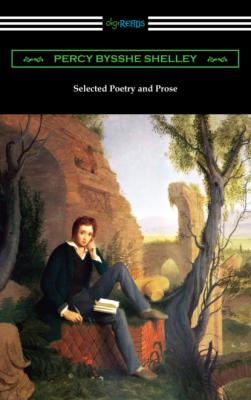Selected Poetry and Prose. Percy Bysshe Shelley
Чтение книги онлайн.
Читать онлайн книгу Selected Poetry and Prose - Percy Bysshe Shelley страница 37
 like a fiery plague breaks out anew
like a fiery plague breaks out anew
In deeds which make the Christian cause look pale
In its own light. The garrison of Patras
Has store but for ten days, nor is there hope
But from the Briton: at once slave and tyrant,
His wishes still are weaker than his fears,
Or he would sell what faith may yet remain
From the oaths broke in Genoa and in Norway;
And if you buy him not, your treasury
Is empty even of promises—his own coin.—
The freedman of a western poet-chief
Holds Attica with seven thousand rebels,
And has beat back the Pacha of Negropont—
The aged Ali sits in Yanina
A crownless metaphor of empire.
His name, that shadow of his withered might,
Holds our besieging army like a spell
In prey to famine, pest, and mutiny;
He, bastioned in his citadel, looks forth
Joyless upon the sapphire lake that mirrors
The ruins of the city where he reigned
Childless and sceptreless. The Greek has reaped
The costly harvest his own blood matured,
Not the sower, Ali—who has bought a truce
From Ypsilanti with ten camel-loads
Of Indian gold.
[Enter a third Messenger.]
MAHMUD. What more?
THIRD MESSENGER. The Christian tribes
Of Lebanon and the Syrian wilderness
Are in revolt;—Damascus, Hems, Aleppo
Tremble;—the Arab menaces Medina,
The Aethiop has intrenched himself in Sennaar,
And keeps the Egyptian rebel well employed,
Who denies homage, claims investiture
As price of tardy aid. Persia demands
The cities on the Tigris, and the Georgians
Refuse their living tribute. Crete and Cyprus,
Like mountain-twins that from each other’s veins
Catch the volcano-fire and earthquake-spasm,
Shake in the general fever. Through the city,
Like birds before a storm, the Santons shriek,
And prophesyings horrible and new
Are heard among the crowd: that sea of men
Sleeps on the wrecks it made, breathless and still.
A Dervise, learned in the Koran, preaches
That it is written how the sins of Islam
Must raise up a destroyer even now.
The Greeks expect a Saviour from the West,
Who shall not come, men say, in clouds and glory,
But in the omnipresence of that Spirit
In which all live and are. Ominous signs
Are blazoned broadly on the noonday sky.
One saw a red cross stamped upon the sun;
It has rained blood; and monstrous births declare
The secret wrath of Nature and her Lord.
The army encamped upon the Cydaris
Was roused last night by the alarm of battle,
And saw two hosts conflicting in the air,
The shadows doubtless of the unborn time
Cast on the mirror of the night. While yet
The fight hung balanced, there arose a storm
Which swept the phantoms from among the stars.
At the third watch the Spirit of the Plague
Was heard abroad flapping among the tents;
Those who relieved watch found the sentinels dead.
The last news from the camp is, that a thousand
Have sickened, and—
[Enter a fourth Messenger.]
MAHMUD. And thou, pale ghost, dim shadow
Of some untimely rumour, speak!
FOURTH MESSENGER. One comes
Fainting with toil, covered with foam and blood.
He stood, he says, on Chelonites’
Promontory, which o’erlooks the isles that groan
Under the Briton’s frown, and all their waters
Then trembling in the splendour of the moon,
When as the wandering clouds unveiled or hid
Her boundless light, he saw two adverse fleets
Stalk through the night in the horizon’s glimmer,
Mingling fierce thunders and sulphureous gleams,
And smoke which strangled every infant wind
That soothed the silver clouds through the deep air.
At length the battle slept, but the Sirocco
Awoke, and drove his flock of thunder-clouds
Over the sea-horizon, blotting out
All objects—save that in the faint moon-glimpse
He saw, or dreamed he saw, the Turkish admiral
And